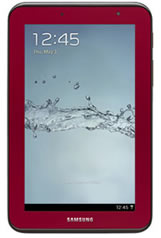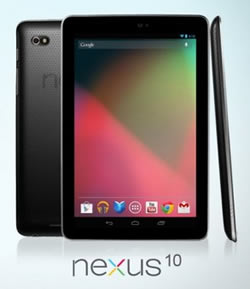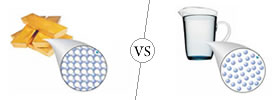Difference between Samsung Galaxy Tab 2 7.0 and Nexus 10
Key Difference: The Samsung Tab 2 7.0 is a 7-inch tablet that offers a PLS TFT LCD display, with approximately 170 ppi density. The device is also available in two versions; Wi-Fi only and Wi-Fi + 4G. The Wi-Fi only tablet is powered by a 1 GHz Dual-core processor and is available with the Android v4.0 Ice Cream Sandwich, while the Wi-Fi + 4G LTE tablet is powered by a 1.2 GHz Dual-core processor and comes with Android v4.1 Jelly Bean. The Nexus 10 is a tablet computer running Android 4.2 (also named Jelly Bean) operating system, which was released with it. It was developed in collaboration with Samsung.
 Samsung Galaxy Tab 2 7.0 is a major upgrade to the company’s original Samsung Galaxy Tab. The tab shares many features to its big brother The Galaxy Tab and the Galaxy Tab 7.0 Plus. The tab is actually a downgrade compared to the Galaxy 7.0 Plus, including the price of the tablet. However, during the launch it was also the only Tablet on the market at that time which served the Android Ice Cream Sandwich right out of the box. The device is also available in two versions; Wi-Fi only and Wi-Fi + 4G. Both the devices differ in a few areas so, when purchasing either device, make sure to once look over the various different features that are offered in the Wi-Fi + 4G, which are missing the Wi-Fi only model.
Samsung Galaxy Tab 2 7.0 is a major upgrade to the company’s original Samsung Galaxy Tab. The tab shares many features to its big brother The Galaxy Tab and the Galaxy Tab 7.0 Plus. The tab is actually a downgrade compared to the Galaxy 7.0 Plus, including the price of the tablet. However, during the launch it was also the only Tablet on the market at that time which served the Android Ice Cream Sandwich right out of the box. The device is also available in two versions; Wi-Fi only and Wi-Fi + 4G. Both the devices differ in a few areas so, when purchasing either device, make sure to once look over the various different features that are offered in the Wi-Fi + 4G, which are missing the Wi-Fi only model.
Both the models offer similar dimensions and major features, with the differences being only with the processor speed, OS, camera features and colors. The Samsung Tab 2 7.0 is a 7-inch tablet that offers a PLS TFT LCD display, with approximately 170 ppi density. The Plane to Line Switching (PLS) differs from the IPS technology of the other tablets and while it provides decent wide viewing angles, it still has a high propensity for reflecting surfaces. The display also lags compared to the other IPS displays with higher resolutions. The tablet is small and sleek compared to the other 7-inch devices making it lighter and easier to hold. The device has a sturdy design and has an all-grey plastic back. It has a thick bezel with a light grey screen. The device houses the power button, the volume button and the IR-port on the right side of the device, the microSD card slot is placed on the left side covered by a plastic flap. The 3.5mm jack is on top of the device and docking port is at the bottom.
The Wi-Fi only tablet is powered by a 1 GHz Dual-core processor and is available with the Android v4.0 Ice Cream Sandwich, while the Wi-Fi + 4G LTE tablet is powered by a 1.2 GHz Dual-core processor and comes with Android v4.1 Jelly Bean. Both devices offer 1 GB RAM and are available with 8/16/32 GB internal storage capacity that is expandable by 32 GB. The tablets house a 3.15 MP rear camera and a VGA front camera for video conferencing. The VGA camera is a downgrade from the 2 MP offered on Galaxy Tab 7.0 Plus. The camera also comes with a Flash that is placed under the camera on the back of the device. The 4 LTE tablets also come with additional camera features such as: Smile Shot, Geo-tagging, Editing Modes, Camcorder, DivX, HD Recording, HD Playback, Video Share and Online Image Uploading.
Both the devices sport IR blasters, which allow the tablet to be used as a fully-functioning remote control. The device houses a non-removable Lithium-ion 4,000 mAh that provides a lasts a good amount of time on the Wi-Fi as well as the 4G network. The device is available in black and white on the Wi-Fi + 4 LTE, while an additional Garnet Red color has been added to the line for the Wi-Fi only tablet. Both the models come with various built in Samsung Applications and have been approved for Enterprise by the Company, something known as SAFE (Samsung Approved for Enterprise). This includes an array of business applications such as: Microsoft® Exchange ActiveSync, Virtual Private Network (VPN) Access, Polaris® Office, Video Chat, Cisco WebEx, EAS IT Policy, HW Encryption and Sybase Afaria. However, it lacks in terms of tablet based applications in Google Play. Well, that is not exactly Samsung’s fault but it is one of things that have been keeping pushing sales of Apple tablets more than Android Tablets. Google Play has not been able to offer enough applications that support the tablet format. This problem should only be temporary as the demand for tablets is on the rise in the market.

Among the number of various companies launching phones based on Google’s Android, Google has also launched its own line of smartphones based on Android, called the Google Nexus. Each device in the Nexus line is produced via collaboration between Google and a leading original equipment manufacturer (OEM) partner. The Nexus devices in general have an advantage over other devices in that the Android in the Nexus devices is pure, i.e. the Android does not have any manufacturer or wireless carrier modifications to it, such as a custom graphical user interface. The Android also has an unlockable bootloader to allow further development and end-user modification, all of which is usually blocked on other Android smartphones.
The Nexus 10 is a10-inch tablet computer running Android 4.2 (also named Jelly Bean) operating system, which was released with it. It was developed in collaboration with Samsung. It is Google’s second tablet, directly following the Nexus 7. It features a 10.1-inch, 2560×1600 pixel display, which at the time of its release was the highest resolution display for a tablet. The Nexus 10 features a Samsung Exynos 5250 system on chip, a dual-core 1.7 GHz Cortex A15 central processing unit and a quad-core ARM Mali T604 graphics processing unit. The Nexus 10 was launched in two storage sizes, 16 GB and 32 GB
The Nexus 10 features Photo Sphere, a new camera technology that allows one to take 360 deg Panorama shots. The tablet also features a quick settings menu, allows for application of widgets on the lock screen, as well as gesture typing; an updated version of Google Now; and multiple user accounts for tablets. The tablet offers a new share and customize feature that allows multiple users to create their own profile and customize it according to their own needs. The tablet offers a 5 MP rear camera and a 1.9 MP front camera for video chatting. The tablet does not support SIM capability. The device also allows nine people to chat simultaneously using Google Hangouts. The Nexus 10 is available for approximately USD 399, with the price varying depending on the model.
The information for the detailed table about the two phones has been taken from the Samsung website, pcmag.com, engadget.com, Google website and GSMArena.com.
|
|
Samsung Galaxy Tab 2 7.0 |
Nexus 10 |
|
Launch Date |
April 2012 |
November 2012 |
|
Company |
Samsung |
Google; designed in collaboration with and manufactured by Samsung. |
|
Size |
193.7 x 122.4 x 10.5 mm |
263.9 x 177.6 x 8.9 mm |
|
Display |
7.0 in (18 cm) PLS TFT LCD display |
Super PLS TFT capacitive touchscreen, 16M colors |
|
Screen |
1024 × 600 pixels (~170 ppi pixel density) |
2560 x 1600 pixels, 10.1 inches (~299 ppi pixel density) |
|
Protection |
N/A |
Corning Gorilla Glass 2 |
|
Weight |
345 grams |
603g (1.33 lb) |
|
2G Network |
GSM 850 / 900 / 1800 / 1900 |
N/A |
|
3G Network |
HSDPA 900 / 2100 - GT-P3100 HSDPA 850 / 900 / 1900 / 2100 - GT-P3105 |
N/A |
|
4G Network |
Depends on market capability |
N/A |
|
GUI |
TouchWiz UX UI |
Pure Android |
|
CPU speed |
1 GHz Dual-core processor/ 1.2 GHz Dual-core Qualcomm processor (4G) |
Dual-core 1.7 GHz Cortex-A15 |
|
GPU |
PowerVR SGX540 |
Quad-core Mali T604 |
|
OS |
Android OS v4.0.3 (Ice Cream Sandwich), upgradable to v4.1.1 (Jelly Bean) |
Android OS, v4.2 (Jelly Bean), upgradable to v4.2.1 (Jelly Bean) |
|
Chipset |
TI OMAP 4430 |
Exynos 5250 |
|
RAM |
1 GB RAM |
2GB RAM |
|
SIM Size |
mini-SIM |
N/A |
|
Internal Memory |
8/16/32 GB |
16/32 GB storage |
|
Expandable Memory |
Up to 32GB |
None |
|
Sensors |
Accelerometer, digital compass, light and proximity |
Accelerometer, gyro, proximity, compass, barometer |
|
Connectivity |
2G, 3G, 4G, Bluetooth technology v3.0, USB 2.0 Host, Wi-Fi 802.11 a/b/g/n, DLNA and Wi-Fi Direct |
WiFi 802.11 b/g/n (MIMO+HT40) Bluetooth NFC (Android Beam) Dual side NFC Micro USB Magnetic Pogo pin charger Micro HDMI 3.5mm headphone jack |
|
Data |
GPRS, EDGE, WLAN, Bluetooth, USB |
WiFi, NFC, USB |
|
Speed |
HSPA+ 21Mbps 850/ 900/ 1900/ 2100 |
- |
|
WLAN |
Wi-Fi 802.11 a/b/g/n, DLNA, Wi-Fi Direct, dual-band, Wi-Fi hotspot |
Wi-Fi 802.11 b/g/n, Wi-Fi Direct, DLNA |
|
Bluetooth |
Bluetooth v3.0 with A2DP, HS |
Bluetooth v3.0 with A2DP |
|
USB |
USB v2.0, USB On-the-go |
Micro-USB v2.0 |
|
Primary Camera |
3.15 MP, 2048x1536 pixels |
5 MP, 2592х1936 pixels, autofocus, LED flash |
|
Secondary Camera |
VGA |
1.9 MP |
|
Video |
Full HD @30fps |
1080p@30fps |
|
Camera Features |
|
|
|
Sound Enhancement |
SoundAlive |
No |
|
Audio supported formats |
MP3, AAC, AC-3, AMR, FLAC, MID, WMA, WAV, OGG |
MP3/WAV/eAAC+/WMA/ Flac player |
|
Video supported formats |
3GP, ASF, AVI, MP4, WMV, FLV, MKV, WebM |
MP4/H.264/DivX/ WMV player |
|
Battery Capacity |
Non-removable Lithium-ion 4,000 mAh |
Non-removable lithium-ion polymer 9,000 mAh battery |
|
Talktime |
2G: 40 hours 3G: 20 hours |
N/A |
|
Standby Time |
2G: 1190 hours 3G: 1080 hours |
- |
|
Available Colors |
Black, White, Red |
Black |
|
Messaging |
SMS(threaded view), MMS, Email, Push Email, IM, RSS |
Email, Push Email, IM, RSS |
|
Browser |
HTML5, Adobe Flash |
HTML5 |
|
Radio |
No |
No |
|
GPS |
A-GPS support and GLONASS |
Yes, with GLONASS |
|
Java |
Java via Java MIDP emulator |
None |
|
Additional Features |
|
|
Image Courtesy: samsung.com, androidheadlines.com









Add new comment